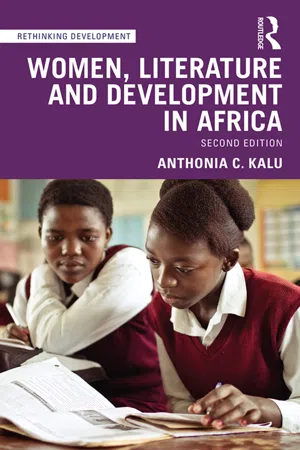
- 204 pages
- English
- ePUB (mobile friendly)
- Available on iOS & Android
Women, Literature and Development in Africa
About this book
This book is a powerful exploration of the role of women in the evolution of African thinking and narratives on development, from the precolonial period right through to the modern day. Whilst the book identifies women's oppression and marginalization as significant challenges to contemporary Africa's advancement, it also explores how new written narratives draw on traditional African knowledge systems to bring deep-rooted and sometimes radical approaches to progress.
The book asserts that Africans must tell their own stories, expressed through the complex meanings and nuances of African languages and often conveyed through oral traditions and storytelling, in which women play an important role. The book's close examination of language and meaning in the African narrative tradition advances the illumination and elevation of African storytelling as part of a viable and valid knowledge base in its own right, rather than as an extension of European paradigms and methods.
Anthonia C. Kalu's new edition of this important book, fully revised throughout, will also include fresh analysis of the role of digital media, education, and religion in African narratives. At a time when the prominence and participation of African women in development and sociopolitical debates is growing, this book's exploration of their lived experiences and narrative contribution will be of interest to students of African literature, gender studies, development, history, and sociology.
Frequently asked questions
- Essential is ideal for learners and professionals who enjoy exploring a wide range of subjects. Access the Essential Library with 800,000+ trusted titles and best-sellers across business, personal growth, and the humanities. Includes unlimited reading time and Standard Read Aloud voice.
- Complete: Perfect for advanced learners and researchers needing full, unrestricted access. Unlock 1.4M+ books across hundreds of subjects, including academic and specialized titles. The Complete Plan also includes advanced features like Premium Read Aloud and Research Assistant.
Please note we cannot support devices running on iOS 13 and Android 7 or earlier. Learn more about using the app.
Information
1
THE AFRICAN WOMAN AND AFRICAN LITERARY CRITICISM
Activist feminism
Missionary feminism
Table of contents
- Cover
- Half Title
- Series
- Title
- Copyright
- Contents
- Introduction
- 1 The African woman and African literary criticism
- 2 African literary theory and research
- 3 Paradigms of tradition and modernity: (Re)centering women in African literature
- 4 Nwanyibuife: Women and the social construction of gender in African development
- 5 Language and development in Africa
- 6 Ala: Gendered space and development in Africa
- 7 Women, narrative traditions and African religious thought
- 8 Women, education and the African narrative
- Conclusion: how shall we sing their strange songs in our homelands?
- Bibliography
- Index